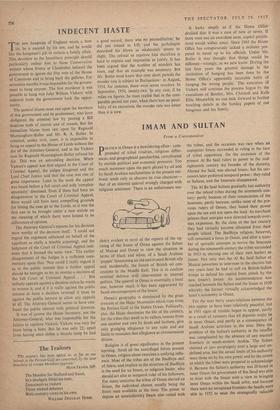INDECENT HASTE
THE new hangman of England wears a bow tie, he is assisted by his son, and he would like the hangman's job to remain a family affair.
This devotion to the hereditary principle should particularly endear him to those Conservative women whose frenzy at Llandudno induced the government to ignore the free vote of the House of Commons and to bring back the gallows. For seventeen months it was impossible for the govern- ment to hang anyone. The first murderer it was possible to hang was John Willson Vickers; with indecent haste the government took the oppor- tunity.
The general blame must rest upon the members of this government and its predecessor, who have disfigured the criminal law by passing a Bill destitute both of morals and of reason. But the immediate blame must rest upon Sir Reginald Manningham-Buller and Mr. R. A. Butler. In criminal, unlike civil, cases, it is impossible to • bring an appeal to the House of Lords without the fiat of the Attorney-General, and in the Vickers case Sir Reginald Manningham-Buller refused his fiat. This was an astounding decision. When Vickers's appeal was first argued in the Court of Criminal Appeal, the judges disagreed and the Lord Chief Justice said that the case was one of great importance. Later in the week the appeal was heard before a full court and with 'complete unanimity' dismissed. Even if there had been no disagreement in the Court of Criminal Appeal, there would still have been compelling grounds for letting the case go to the Lords, as it was the first one to be brought under a new statute on the meaning of which there were bound to be differences of opinion.
The Attorney-General's reasons for his decision were worthy of the decision itself: 'I could not regard the argument advanced on behalf of the appellant as really a tenable argumegt, and the judgment of the Court of Criminal Appeal indi- cates that it formed the same view.' The earlier disagreement of the Judges is a sufficient com- mentary upon that. 'Nor could I really regard it as in the public interest that a further appeal should be brought to try to reverse a decision of the full Court of Criminal Appeal. . . But nobody appeals against a decision unless he wants to reverse it, and if it is really against the public interest to have a decision reversed it must be against the public interest to allow any appeals at all. The Attorney-General seems to have con- fused the public interest with political interests.
It was of course the Home Secretary, not the Attorney-General, who was responsible for the failure to reprieve Vickers. Vickers was very far from being a hero. But he was only 22; apart from having once stolen a bicycle lamp he had a good record; there was no premeditation; he did not intend to kill; and the pathologist described his blows as Moderately severe to slight. The refusal to reprieve him therefore is hard to explain and impossible to justify. It has been argued that the number of murders has risen, and that an example was . necessary. But Mr. Butler must know that over short periods the murder rate is subject to fluctuations : in August, 1954, for instance, there were seven murders. In September, 1954, twenty-two. In any case, if he relies on figures, he must realise that in the com- parable period last year, when there was no possi- bility of an execution, the murder rate was lower than it is now. It looks simply as if the Home Office 43ecided that it was a case of now or never. If there were not an execution soon, capital punish- ment would wither away. Since 1945 the Home Office has conspicuously laCked a minister pre- pared to stand up to his officials. Under Mr. Butler it was thought that things would be different—wrongly, as we now know, During the last four years the greatest damage to the institution of hanging has been done by the Home Office's apparently incurable habit of hanging the wrong people. The execution of Vickers will continue the process begun by the executions of Bentley, Mrs. Christofi and Ruth Ellis. Meanwhile we can look forward to further touching details in the Sunday papers of our hangman and his family.






























 Previous page
Previous page